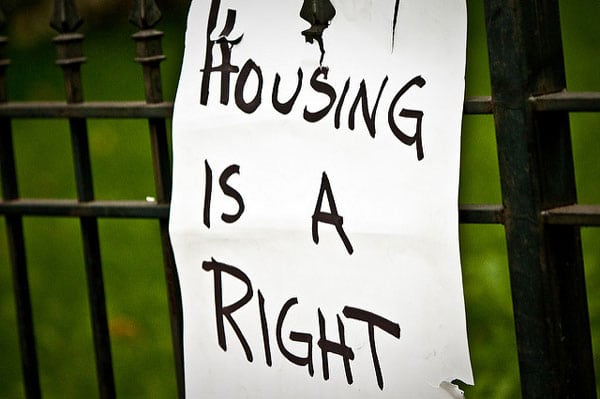
September 26, 2018; Boston Globe and the Atlantic
Earlier this month, at NPQ, we covered the fiftieth anniversary of a 1968 housing bill that led to the construction of over a million new units of affordable housing in three years before it was scuttled by the Nixon administration. These days, housing production, hobbled by an underfunded system of tax credits, falls far short of those levels. Earlier this year, Benjamin Schneider in City Lab cited a report by an advocacy group called Up for Growth, which calculates that US housing production fell 7.3 million units short of demand from 2000 to 2015, which has led to increasing shortfalls in housing affordability in many US communities.
Now, Senator Elizabeth Warren (D-MA) seeks to close that gap. While not as ambitious as the US 1968 housing law, Warren’s bill, with a price of $500 billion over 10 years, would, if passed, easily be the largest federal housing initiative in decades.
“Housing is the biggest expense for most working families—and costs for everyone, everywhere are skyrocketing,” notes Warren.
Warren’s bill is called the American Housing and Economic Mobility Act. The bill, explains Nik DeCosta-Klipa of the Boston Globe, involves two main components: 1) federal funds for housing construction and assistance, 2) incentives for localities to loosen zoning rules. Warren’s bill would fund its goals by raising estate taxes by a like amount.
Specific elements include the following:
Sign up for our free newsletters
Subscribe to NPQ's newsletters to have our top stories delivered directly to your inbox.
By signing up, you agree to our privacy policy and terms of use, and to receive messages from NPQ and our partners.
- $470 billion over 10 years to support existing federal affordable housing programs, such as the Housing Trust Fund and Capital Magnet Fund. Because the current annual budget of the US Department of Housing and Urban Development (HUD) is $48 billion, effectively this provision alone would double HUD’s budget.
- The bill would provide down-payment grants to first-time homebuyers living in formerly redlined or segregated areas in an effort to provide some redress for historical federal practices of redlining, which denied people of color access to federally subsidized loans to buy homes.
- The bill would designate $2 billion to support borrowers—mostly in rural and suburban areas—who still have negative equity on their mortgages as a result of the Great Recession.
- The bill includes a $10 billion grant program that communities can use to build “infrastructure, parks, roads, or schools,” under the condition that local governments reform land-use rules.
Writing in the Atlantic, Madeleine Carlisle notes that the bill also “restructures the Community Reinvestment Act (CRA), a 1977 law proposed to monitor banks with discriminatory loan policies against communities of color. Warren’s bill gives the CRA more enforcement mechanisms and expands its policing power to include credit unions and nonbank mortgage companies, which were not as ubiquitous when the bill was passed.” CRA, NPQ’s Rick Cohen once noted, is “one of the nonprofit sector’s biggest advocacy triumphs.”
According to a report written by Mark Zandi, chief economist for Moody’s Analytics, the law could generate three million housing units by 2028. “By the end of the 10-year horizon, affordable housing supply should be approximately equal to demand,” Zandi adds.
Alexander Casey, a policy adviser at Zillow, notes that, by comparison, “the Low-Income Housing Tax Credit program…helped build around three million low-income units from 1987 to 2016.” In other words, the increase in housing production stemming from Warren’s bill alone would produce as many housing units in 10 years as has been produced in the previous two decades.
Zandi also estimates that Warren’s bill would reduce rent inflation from four percent to three percent a year, resulting in rents that are 10 percent lower by 2028. The housing construction financed by the bill could lead to 1.5 million jobs during peak construction years.
To fund this, Warren proposes raising the estate tax. The current tax, as passed in the 2017 tax bill, exempts all estates with assets of up to $11.2 million from taxation ($22.4 million for couples). Warren’s bill would lower the exempt level to $3.5 million for individuals or $7 million for couples, as was the case during the Bush administration. Estates larger than that level would face a tax rate of 55 percent for the portion of the estate above the exemption level, with rates rising as high as 75 percent for estates valued at $1 billion or more. In total, Warren’s office estimates that about 10,000 people a year would face these taxes.
While Warren’s bill is unlikely to pass soon, it has generated considerable nonprofit and housing advocate support. Diane Yentel, head of the National Low-Income Housing Coalition, says the bill “would help millions of the lowest-income seniors, people with disabilities, families with children, and individuals who struggle to pay rent and the half a million people without a home at all.” Matthew Desmond, author of Evicted: Poverty and Profit in the American City, says it would “reduce rents for millions of Americans and open new doors to home ownership.”—Steve Dubb













